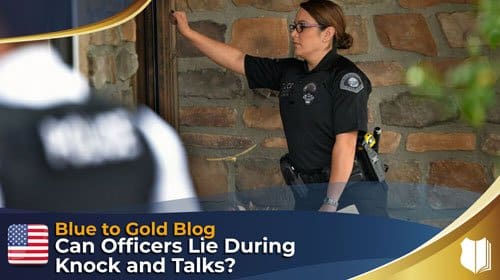The question of the day is: Can officers lie during a knock and talk?
The answer is, “Yes.” Certainly officers are not required to share all their inner secrets about an investigation with an occupant. So that’s not a problem.
Courts have upheld deception during investigations for centuries. But I want to transition to another related question. And that is, Can officers lie to get into a home to see evidence and so forth?
And there is a general rule for known officers. These are not undercover officers. These are known officers, that the occupants know they’re dealing with the police. The general rule is that officers should not lie about their primary purpose about coming into the home.
Let me give you some examples. In an infamous case, officers told the occupants that there was a bomb planted somewhere in the building, that they got a bomb threat, and they want to look for it. What the cops were really after was plain view evidence of drugs. Well, they get into the apartment to look for the bomb, they find drug evidence, and we go from there. The court easily suppressed that evidence, because the primary purpose was a lie. No rational person would say “no” to the police after hearing that there’s a bomb somewhere in the building.
Let me give another example. Officers were investigating disability fraud. The occupant was suspected of being highly mobile, and he was lying about his disability and so forth. They wanted to catch him on camera inside his home moving around with no issues. They told him that he was the victim of identity theft. This was a lie. There was no evidence of him being the victim of an ID theft. Based on this, though, the occupant invites them in, and they secretly record him moving around and so forth and use that against him in his disability disability fraud case. That was suppressed, because the primary purpose was a lie, that they were there about ID theft.
A third example follows. Cops told the suspect that they were following up on a two year old burglary that he reported. He was the victim of the burglary, but that was a lie. The case was closed, there were no leads, and so forth. What they were really after was child porn evidence. They wanted to see if there was something in plain view. So they told him this and they wanted to talk to him further inside the home. So the occupant invited them in, and they’re acting like they’re taking more information about stuff that was stolen. All the while they’re looking around the home for the plain view evidence. That was suppressed; the primary purpose was a lie, there was no investigation.
But compare it to this case, officers were investigating a burglary. And the occupant was the target. They were hoping to get into the home to see if there was plain view evidence of the property stolen. Now, when they went to his house, they said, Look, we’re investigating a burglary. And he asked “Am I a suspect?” and the cops lied and said, “No, you’re not.” He says, ‘Come on in.” And while they’re taking the report, and so forth, and asking him questions, they see plain view evidence. That was upheld as constitutional, because the primary purpose was not a lie. They were there for the burglary. But the secondary purpose, of course, was also to see if they saw plain view evidence.
So this is just about telling somebody why you’re there. Remember, though, if you remain silent about why you’re really there, saying you just want to talk, that’s not the primary purpose. If you’re telling the person the purpose of the talk, and they ask you why you’re there, you should tell them something related to the primary purpose. You can be general about it.
But be careful because that’s what the courts are looking for here. When you’re dealing with the home, it is the most protected area under the Fourth Amendment, and courts are very cautious about you lying to get into the home. If they grant you too much room here, they feel it could be abused.
I hope this helps. It’s kind of an interesting little question, so I wanted to expand on it. Keep your questions coming. And until next time, stay safe.











